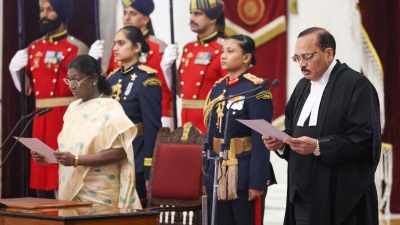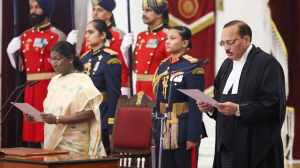Maharashtra panel members up in arms against govt’s Maratha quota push: OBC activist to lawyer to ex-judge
Two Backward Commission members have resigned — and a third one is considering it — alleging Shinde govt’s pressure for obtaining data that can justify quota for Marathas
 Laxman Hake; Chandralal Meshram; Balaji Killarikar
Laxman Hake; Chandralal Meshram; Balaji Killarikar In the first week of December, two out of nine members of the Maharashtra State Backward Class Commission (MSBCC) — Balaji Killarikar and Laxman Hake — resigned, alleging growing government interference in the panel’s functioning. Another member, Chandralal Meshram, too, has said that he is considering resignation.
The trigger for their resignation moves was the Eknath Shinde-led government asking the quasi-judicial authority to “ascertain existence of exceptional circumstances and or extraordinary situations in the context of Maratha community justifying exceeding of the limit of 50% reservation as laid down in the judgements of the Supreme Court”.
In his letter dated November 13 to the Commission chairman Justice (retired) Anand Nirgude, Chief Minister Shinde requested the panel to examine a request for the inclusion of the Maratha community into the Backward Classes or OBC. Attached to his letter, a detailed 10-point Terms of Reference (ToR) asked the panel to determine criteria and parameters to ascertain social, educational and economic backwardness, and to define exceptional circumstances and/or extraordinary situations that can be applied for reservation benefits.
In the eyes of the protesting members, the ToR implicitly asks the Commission to obtain data that can justify reservation for the Maratha community, a politically charged issue that has rocked the state over the past several months, ever since protests led by Maratha activist Manoj Jarange Patil, demanding reservation for the caste, forced the government to reopen a case over which an earlier report of the Commission, under Justice (retired) M G Gaikwad, had been rejected by the Supreme Court in 2021.
A fourth member, who did not wish to be named, has told The Indian Express that in the December 1 meeting of the panel, the dissenting members disapproved the idea of collecting data only on Marathas, and instead pushed for collecting data of all communities. “The government wants a report from the Commission on a pre-decided assumption that Marathas are backward. This is an independent Commission, which will collect and analyse the data. Only then can it draw a conclusion on the backwardness of the community. How can the government ask the Commission to give data to include a particular community into the Backward Classes?” the member said.
Here is a look at the Commission members who have come out openly against the government’s alleged interference in its functioning over the Maratha quota issue.
Laxman Hake, 45, OBC leader
A prominent OBC activist and leader from Solapur district of western Maharashtra, Hake has worked with Rashtriya Samaj Party (RSP), whose leader Mahadev Jankar is a Dhangar, which is a caste of herders mostly found in western India. He has been actively working on issues related to seasonal workers involved in harvesting sugarcane, as well as issues of nomadic tribes, including those of Dhangars. He has also been involved in various state-wide OBC agitations. In 2022, Hake joined the Shiv Sena led by Uddhav Thackeray, and is currently a local spokesperson of the party.
Hake quit the Commission on December 2. “I felt that there was growing interference from the government and it was unacceptable to me,” said Hake, after his resignation.
Balaji Killarikar, 55, advocate
Killarikar is one of the first members of the MSBCC to have voiced discontent over alleged government interference in the functioning of the body. A lawyer at the Aurangabad bench of the Bombay High Court for over two decades, Killarikar is a strong supporter of a caste census and a firm believer of the independence of authorities like the Backward Class Commission. Killarikar is also known for using Public Interest Litigations (PILs) as a tool to highlight issues such as sexual harassment of women at the workplace, protection of the interests of poor children in residential ashram schools, and the protection of the rights of Backward Classes.
Killarikar resigned on December 1. “This is a quasi-judicial authority and is not meant to please the government or to write a report that suits the government. We are here to give a factual report. There has been growing interference in the functioning of the Commission from the government and the chairperson was called to discuss issues that are currently being discussed in the Commission. He (chairperson) has failed to maintain its impartiality and instead follows what is told to him by the government. I feel that he should step down from the post,” Killarikar said after his resignation.
Chandralal Meshram, 68, retired judge
Meshram is a retired judge from a district and sessions court. Though he is yet to resign from the Commission, while speaking to The Indian Express, Meshram said that he too was contemplating resignation. “We are not government servants. We are not supposed to work based on government orders. I haven’t yet made the decision, but yes, I am thinking about resigning. I will discuss with some seniors and take a call in the next 2-3 days,” he said.






- 01
- 02
- 03
- 04
- 05

























